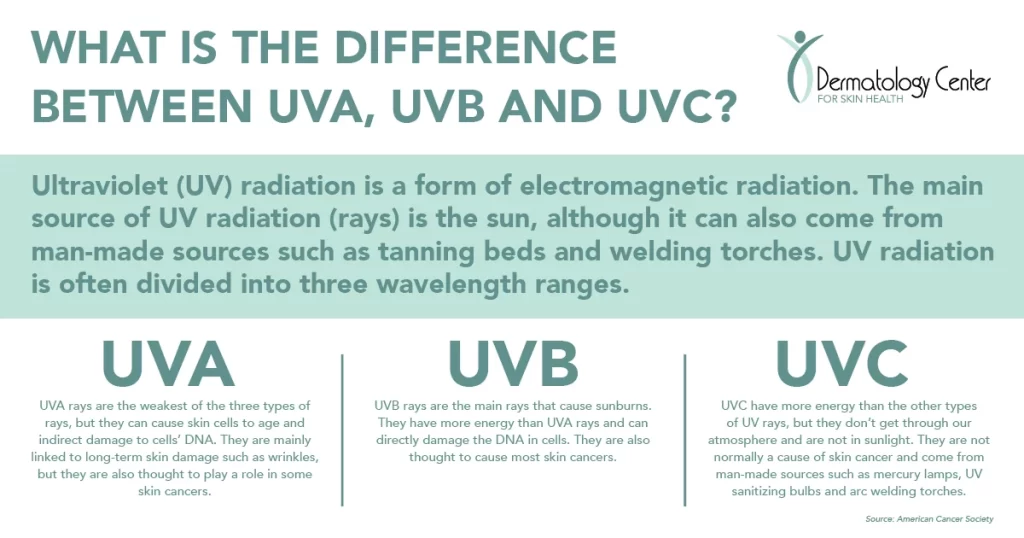Summer is here! Make a splash, have fun in the sun by the pool with your friends. Pack all of your essentials, including sunscreen. Not sure which kind to purchase? Let us help you decide between choosing chemical sunscreen or physical sunscreen.
According to the Centers for Disease Control and Prevention, roughly five million Americans are treated for skin cancer; however, most skin cancers can be prevented by avoiding exposure to ultraviolet (UV) rays from the sun.
Read on to learn the difference between chemical sunscreen and physical sunscreen, and find out which option is best for you.
UNDERSTANDING THE BASICS
With skin being the largest organ in your body, it’s important to take the proper steps needed for care and treatment. Your skin is in a constant state of growth as new skin cells develop. From your lifestyle habits to your location and genetics, many factors should be taken into consideration when deciding how to give your skin the treatment it requires.
Listed below are basic terminology explained typically used when discussing skin health.
- UVA rays: Penetrates your skin deeply, causing premature aging through excessive sun exposure.
- UVB rays: Causes the superficial layers of your skin to burn or redden.
- Sunscreen: A product that absorbs most of the UV rays before it gets to the skin. This product can be either chemical or physical as it’s designed to protect the skin from the sun; however, it cannot block UV rays from the sun.
- SPF: SPF stands for Sun Protection Factor. It measures the ability to protect your skin from UVB rays. The amount of time it takes unprotected skin to get burned by SPF is multiplied.

CHEMICAL SUNSCREEN
Chemical sunscreen works by changing UV rays into heat and releasing that heat from the skin.
The absorbing sunscreen is made from organic, carbon-based, compounds:
- Oxybenzone: absorbs UVB and UVA rays, reduces risk of DNA damage
- Octinoxate: absorbs UVB rays from the sun, minimizes DNA photodamage
- Octisalate: colorless oily liquid with slight floral odor used to absorb UVB rays from the sun
- Avobenzone: sunscreen blocker, limits the impact of UV rays on the skin
Benefits:
- Thinner and spreads on the skin more easily. This makes the sunscreen more wearable during the day.
- Less sunscreen is needed for protection. There is no risk of no spaces between sunscreen molecules after application.
- Compound formulas. Compound formulas are more likely to provide effective broad-spectrum protection.
- No significant streaking or white spots. Oftentimes, physical sunscreen can leave blocky, white streaks on the skin after application.
- More water resistant. Chemical sunscreen is more resistant to sweat or water compared to physical sunscreen.
Disadvantages:
- Increase in existing brown spots. Discoloration can occur due to higher internal skin temperatures.
- Takes longer to sink in. It takes the sunscreen 10 to 20 minutes after application to dry and create the protective film over your skin.
- Irritation and stinging can occur. Multiple ingredients are used and combined to create broad-spectrum UVA and UVB protection.
- More frequent application. Protection levels drop more quickly in direct UV light.
- Can create redness for rosacea-prone skin types. The chemicals change UV rays into heat, which can exacerbate flushing.
- Potential to cause sensitivity. Chemical sunscreens are often presented in combinations of three or four in one product. Due to the combination of chemicals on your skin, they are likely to cause sensitivity compared to physical sunscreens.
- Can clog your pores. This can lead to increased acne.
- Damaging to the oceanic ecosystem. Hawaii is the first state to officially ban chemical sunscreen. Locations like the Key West and the Pacific archipelago of Palu are also banning the usage of sunscreens containing oxybenzone and octinoxate, effective circa 01/01/2021.
More on the banning of environmentally-toxic sunscreen ingredients:
Each year 4,000 to 6,000 tons of sunscreen washes off and into reef areas, according to the National Park Service.
The Key West is banning oxybenzone and octinoxate due to the causation of linked chemicals to cellular damage in coral reefs. Unfortunately, those two ingredients are found in most U.S. sold sunscreens including brands like Neutragena, Coppertone and Aveeno, according to National Public Radio.
- Oxybenzone: an oil that floats on the surface of water
- Octinoxate: contributes to coral bleaching
Hawaii was the first state to ban sunscreen with those ingredients because it “causes mortality in developing coral; increase coral bleaching that indicates extreme stress, cause genetic damage to coral and other marine organisms.”
The Florida Keys wishes to protect the coral reef in North America to minimize harm which is leading to bleaching DNA damage and death of corals.
It is recommended to purchase eco-friendly sunscreens containing ingredients like titanium oxide or zinc oxide. Those substances have not been found to be harmful towards corals. These active minerals are also found in physical sunscreens.
PHYSICAL SUNSCREEN
Physical sunscreen works by sitting on top of the skin to deflect and scatter damage UVA rays from the skin.
The physical blocking sunscreen contains the active mineral ingredients:
- Titanium dioxide: used in food coloring, household products like arts and crafts, home office, personal care, etc.
- Zinc oxide: mild astringent and topical protectant used in bandages, pastes, ointments, dental cement, sunblock, etc.
Benefits:
- Protection against UVA and UVB rays with a naturally broad spectrum.
- Protects from the sun as soon as applied. No wait needed.
- Last longer in direct UV light. Unless you are performing physical activities that cause the skin to get wet or sweat.
- Ideal for sensitive, heat-activated or blemish-prone skin types.
- Longer shelf life.
Disadvantages:
- Rub, sweat or rinse off easily. More frequent application is needed.
- Sometimes leaves a white-ish cast on skin.
- Creates an occlusive film. Increased perspiration during physical activities.
- Thicker. More effort is exerted when rubbing the sunscreen into your skin. It can be difficult for some to fully blend into their skin. It can also feel heavy on the skin. People with oily and acne-prone skin are recommended to remove it thoroughly to avoid initiating skin irritation.
- White drips show on your skin when sweating.
WHICH SUNSCREEN IS BEST FOR YOU — CHEMICAL OR PHYSICAL?
Do you have sensitive skin? Physical sunscreen is less likely to cause stinging irritation on your skin.
Physical sunscreen is better for those with heat-activated skin (rosacea, redness). It deflects heat and energy given off by the sun away from the skin.
If your skin is more prone to clogged pores and blemishes, physical sunscreen is less likely cause those discrepancies.
Active in the summertime with swimming? Chemical sunscreen is the better option for you. It absorbs into the skin quickly and is useful for individuals who need water-resistant formulation, play sports or who sweat a lot during the day.
Choosing the right sunscreen for you depends on personal preferences and skin care goals.
What to look for when choosing sunscreen:
- Broad spectrum: protects you from UVA and UVB rays
- Fragrance-free
- Noncomedogenic: won’t clog your pores
- Oil-free
- Paraben-free
- SPF higher than 30+
Sunscreens available for purchase at the Dermatology Center for Skin Health, PLLC, also contain:
- Antioxidants. Antioxidants like Vitamin C and Vitamin E protect the skin from free radical damage.
- Additional skin care ingredients. Peptides and growth factors, both good for your skin health.
HOW CAN WE HELP | SKIN CANCER PREVENTION | MORGANTOWN, WEST VIRGINIA
Don’t let the damaging UV rays stop you from having a great summer. For further questions about choosing the right sunscreen for you, please give us a call at (304) 598-3888 or schedule an appointment today.
At the Dermatology Center for Skin Health, PLLC, we care about you and your skin health. We look forward to working with you to contribute insightful information catered to your health needs and to provide helpful options.
With over 20 years of medical experience, we provide services to teach you how to take care of your skin and prevent premature aging and skin cancer.


